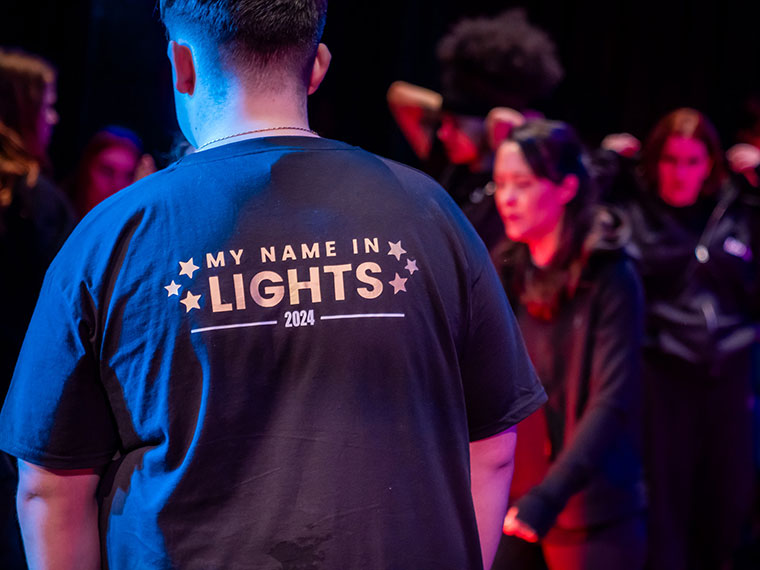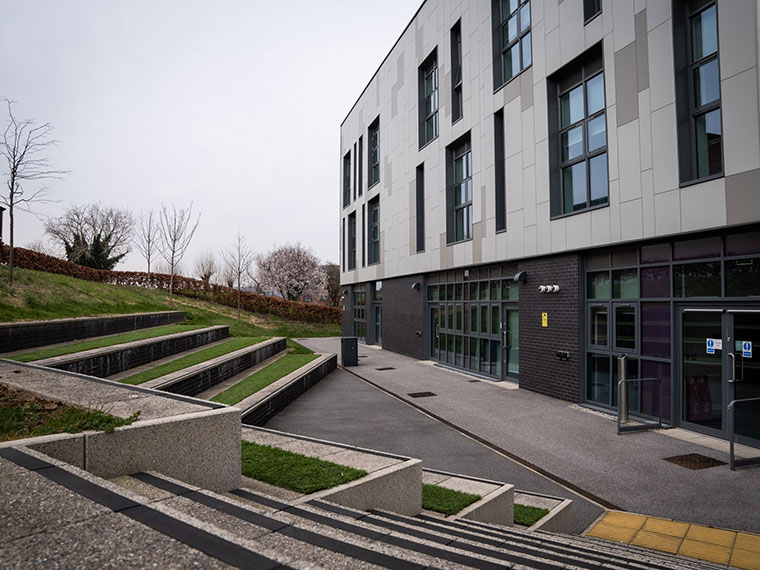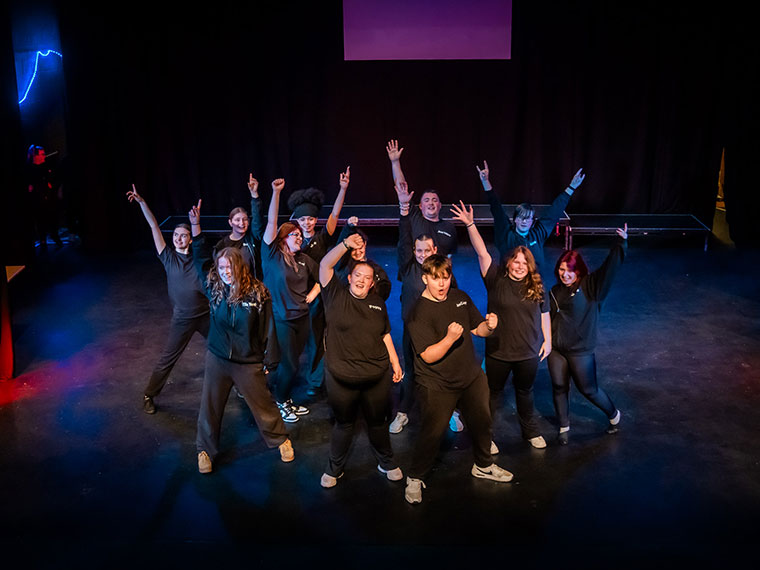Spotlight on… Performing Arts Department
Are you confident, creative, a good communicator and most at home in front of an audience? Then your casting call might lie in a performing arts career.
Whether you see yourself in the spotlight, or are interested in shaping the show backstage, it will take more than just talent to make it big in the entertainment industry.
Acting isn’t just about learning your lines and being able to deliver them well. You have to read between the lines and develop the technical skills needed to make a name for yourself in this fiercely competitive industry
If you’re considering doing a degree in performing arts, read on to find out how University Centre Rotherham can play a part in your education story.

What is a career in performing arts and where could I work?
There isn’t one script for a career in performing arts. It’s a diverse industry with many roles and routes to take. A performing arts career often involves a lot of adlibbing, but could see you work in live theatre, TV and film, or education and community settings.
Your family might have visions of you being on the West End or in their favourite TV show. But most newcomers cut their teeth in fringe or small-scale theatre productions, before auditioning for ensemble, understudy or lead roles.
Most performing arts jobs work on a self-employed or freelance basis and contracts will vary depending on things like the production company and how long the production runs for. This means performers often have additional ‘muggle’ jobs to financially support their acting dreams.
As well as acting, a career in performing arts can be a behind-the-scenes role such as within the lighting and wardrobe departments, stage management, casting and talent agencies, or pre- and post-production.

At University Centre Rotherham, our performing arts department has a 99 percent success rate for students gaining employment after their studies.
Graduates from the acting course have gone on to work as professional actors in TV and film, be stand-up comedians with their own touring show, be stage managers, and set up their own educational theatre companies.
Drama school: To be or not to be?
Once upon a time, drama school was the gold standard route into acting. The classic tale of young person from a small town moves to London with just a pipedream and a knapsack (or suitcase) to become a star. If you didn’t have a drama school on your CV, you might as well not turn up to an audition.
But the industry has changed. Scholarships are few and far between these days, and working class students are cripplingly aware of the financial drawbacks of going off to drama school in the Big Smoke.
Plenty of Hollywood A-listers have made it without going to drama school. Jennifer Lawrence. Johnny Depp. Christian Bale. They didn’t have formal training but still went on to land roles like Katniss Everdeen, Captain Jack Sparrow and Batman.
Others studied drama or acting at universities rather than traditional performing arts schools, including Sherlock’s Benedict Cumberbatch, The Rocky Horror Picture Show’s Tim Curry, and Gavin and Stacey’s Ruth Jones.
There are now more options when it comes to breaking into the entertainment industry, and embarking on a degree is one of them. Higher education give students a more well-rounded approach to learning, with a focus on technical and soft skills needed to become a versatile worker.
What could I study at University Centre Rotherham?
At University Centre Rotherham, we offer a Bachelor of Arts degree in Theatre, Acting and Performance.
This three-year degree is accredited by the University of Hull and combines practical sessions with theoretical course work and assessments.
It offers a very full and balanced syllabus that covers all bases. You’ll learn how to find your voice as an actor and how to use your body to create characters. You’ll study Shakespeare and historical texts alongside how to devise innovative, contemporary pieces.
This pursuit of knowledge not only improves your acting skills, but also helps you fall in love with theatre and all forms of acting.

In the first two years, there will be teaching on acting with a mask, acting for TV and screen, acting for educational purposes in the community, and acting in site-specific performances.
The final year of study is focused on personal and professional development. You’ll conduct a creative research dissertation, culminating in a final performance. This is usually held at the world-famous Crucible Theatre in Sheffield; last year our students received a standing ovation from a full capacity audience.
Why choose University Centre Rotherham?
One of the biggest pulls for learners who choose to study performing arts at University Centre Rotherham is our theatre space. Our sister site, Rotherham College, has a 100-seater theatre, the standard and size of which is seldom found in drama schools. The archetype of theatres, it’s designed so that performers can see everyone in the audience, helping them connect and give a captivating performance.
Over at University Centre Rotherham, there is an outdoor amphitheatre that is used in better weather conditions for performances and assessment.

The performing arts department also has access to three rehearsal rooms, a dance studio, and a digital suite for theory work.
You’ll be taught by people who have extensive experience in the performing arts industry. Our teaching team here at University Centre Rotherham has graduates of leading performing arts schools like East 15, Rose Bruford, and SLP College.
And they all continue to work in industry; some are professional actors in TV and film, others run their own musical theatre academies, and one of our lecturers is an in-demand drama therapist.

Craig Shepherd is a senior lecturer in the performing arts department who’s worked here for almost 20 years. He still works as a professional actor and will be inspiring students with a run of his award-winning one-man show next spring.
He says: “Teaching is all about creating something; different back stories and characters. We pride ourselves on putting our students first and encourage them to find their own sense of practice and style.
“But neither do we lie to them. It’s not an easy profession; you’ll never find another career where you’ll face as many knockbacks. We can’t promise to make you a star or get you work. But we will equip you with the skills to work hard for your dream career and be able to handle yourself in auditions and bounce back from rejection and criticism.”
This high standard of teaching continues to attract students new and old. Over the last two years, the performing arts department at University Centre Rotherham has had a big intake, and this is expected to continue in 2025.
Many of our learners progress from the further education courses at Rotherham College, opting for familiarity and the opportunity to stay at home instead of moving away to study. In 2025, we’re predicting a 100 percent retention rate from our FE learners who have all expressed an interest in continuing their studies with us at HE level.
However, University Centre Rotherham also appeals to mature learners over 21 who are looking to retrain and finally pursue their dreams of working in the entertainment industry. Last year, the department’s oldest graduate was 45 and left University Centre Rotherham with a first-class degree.
Students are also only in for two days a week, meaning you can still work, volunteer or take part in amateur dramatics alongside your degree. Plus, our tuition fees are far less than the average university, at £6,900 per year.
Will I get any work experience at University Centre Rotherham?
The theatre, acting and performance degree affords our students the chance to take part in various live projects throughout their time at University Centre Rotherham. Past learners have worked with a range of companies such as Gratso Productions, Breakout Arts, Open Minds Theatre Company, A Mind Apart Theatre, and Rotherham Council events team.
We also have close links to our local theatres, including Rotherham Civic and The Crucible in Sheffield. Following last year’s final showcase, two of our learners were offered work placements in stage management.
You’ll go on a residential to the Yorkshire coast to write, act in and direct short films, which are then screened and entered into competitions.
There are also opportunities to deliver workshops to schools, working alongside organisations such as Rotherham United and South Yorkshire Fire and Rescue. Theatre in education might have been made fun of in the past by the likes of the League of Gentlemen, but it’s become a fulfilling and lucrative pathway in the industry and some of our past students have been inspired to start their own educational theatre companies.
The degree course also works in conjunction with our further education provision at Rotherham College. This spill over from FE to HE is unique to University Centre Rotherham and offers a mutual benefit. Our degree students get real-life experience working with their target audience, and our level 2 and 3 learners see the progression opportunities they can aspire to.
What if I decide I don’t want to be an actor?
If you decide that acting isn’t for you, there are many non-acting roles that you can get into with a performing arts degree. You could be a presenter or podcast host, drama therapist within the NHS or private practice, or work with schools, museums or heritage sites to develop performance-based teaching workshops.
If you want to work backstage, some roles to consider are screenwriter, talent agent or casting director, production assistant and stage management, or working in the wardrobe, lighting or props department.

Outside of the entertainment industry, the skills you gain while studying a performing arts degree can be applied in many careers. Teamwork, adaptability, literacy skills and resilience. Building up a showreel of skills will help you stand out in any industry.
“I’m a big believer that performing arts as a discipline offers the most transferrable skills. You build so many soft and interpersonal skills, learning how to interact with others and be a better person,” says Aiden Ross, a performing arts lecturer at RNN Group.
“Whether you end up in front of the camera or behind it, on or off stage, or in any other industry, you’ll have an arsenal of skills and techniques that will benefit your life – both professionally and personally.”
Useful links
Why study at UCR
What our students say
National Student Survey results
University Centre Rotherham (UCR) success stories
For more information on courses, please email ucr@rotherham.ac.uk.












